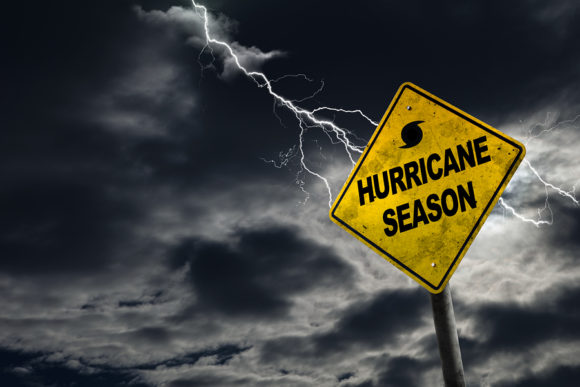As Hurricane Sally bears down on the Gulf Coast, a new survey is highlighting the concerns many Florida residents have about the impact of catastrophic storms on their communities and everyday lives, as well as if they are adequately insured against these events.
The survey of 1,582 Florida voters conducted August 31 to September 2 by “Get Ready, Florida!” – a statewide public education initiative produced by the nonprofit FAIR Foundation, follows one conducted by the organization at the start of this year’s hurricane season. The new survey indicates a slight shift in Floridians concerns about hurricane season at its halfway mark compared with the start of the season in June, during the height of the pandemic.
The most recent survey looked at Floridians recovery expectations for catastrophic storms. Most respondents (68%) said they would find it difficult to pay the average $5,000 hurricane deductible if needed, with only 32% indicating that the $5,000 deductible would be “very manageable” or “no problem” at all to pay following a storm.
More than six in 10 (62%) of Floridians with homeowners or renters insurance said they are unsure what their policies would cover following a storm. And, despite the fact that most hurricane policies do not cover tree and debris removal from yards, 16% of survey respondents said they believed this benefit is covered in their policy. Almost one-third of those surveyed say they would be willing to pay something extra each month in order to have their policies cover these services.
Twenty-seven percent of respondents said they’ve experienced problems relating to yard debris or fallen trees following a storm. This includes 19% who say they have been blocked from their home or driveway, 11% who say they were stuck with large bills for debris removal, and 4% who say that they or a member of their household have been injured trying to remove debris out of the way.
More than two-thirds would like their local governments to plan ahead and line up debris removal services in advance so life can return to normal as quickly as possible following a disaster.
FAIR said the survey serves to help Floridians plan, prepare, and respond to the threat of the annual six-month-long “mean season” of hurricanes and tropical storms.
“In the most hurricane-vulnerable state in the nation, millions of Floridians roll the dice by going without adequate insurance to help them through the ordeal,” said Jay Neal, president of the FAIR Foundation. “This survey shows that while many Floridians lack a clear understanding of what their insurance policy covers, they recognize the wisdom of having their cities and counties prepared to clean up the mess after a storm.”
The survey found that more than two-thirds of respondents (68%) would support their city or county acting before a disaster strikes to invest tax dollars in advance for contracted cleanup services, if and when needed, in order to ensure that resources are available to deploy immediately to clear massive debris and help a return to normal.
“This would mean contracting with a disaster recovery or debris removal business in advance – to be treated as a priority, by providers with the resources and expertise to do the job quickly and efficiently. Since Hurricane Katrina in 2005, many communities in impact zones have adopted this practice,” Get Ready, Florida! said in a statement.
The same number of respondents (51%) as the previous survey say they are “more” or “much more” concerned about this year’s hurricane season than in previous years due to COVID-19 when compared with the previous survey. However, the percentage of those with one specific concern dropped from 91% to 84%, with the top concerns listed in the survey including: more strains on first responders (46%); business closures or more hits to the economy (46%); uncertainty about where would be safe to evacuate to (32%); fewer shelters open due to social distancing (32%); the ability to care for elderly or special needs relatives (29%); and being able to afford supplies (24%).
“One of the great challenges Florida faces is that it adds enough people each year to fill an entire city, and those newcomers – and many who have lived here for years – don’t really know what they have and what they need when it comes to hurricane insurance,” said Craig Fugate, a Florida native who served as the top administrator of the Federal Emergency Management Agency. “Flooding is not covered by your homeowners insurance and requires a flood policy for protection, and flood risk is growing due to more extreme rainfall events during hurricane threats. It’s a good idea for everyone to check their insurance policies now, add flood coverage, and for local governments to get themselves as prepared as they can.”
Get Ready, Florida! is an annual statewide public education campaign working to educate Floridians about hurricane preparedness and safety as part of the National Hurricane Survival Initiative. The survey of 1,582 Florida voters was conducted by Sachs Media Group, with an average margin of error +/- 2.5% at the 95% confidence level. Results
are representative of Florida voters in terms of age, race, gender, region, and political affiliation. Respondents were selected and invited to participate through a random sample of the Florida Voter File.
Topics Trends Catastrophe Natural Disasters Florida Flood Hurricane
Was this article valuable?
Here are more articles you may enjoy.



 Insurance Broker Stocks Sink as AI App Sparks Disruption Fears
Insurance Broker Stocks Sink as AI App Sparks Disruption Fears  What Analysts Are Saying About the 2026 P/C Insurance Market
What Analysts Are Saying About the 2026 P/C Insurance Market  Florida Engineers: Winds Under 110 mph Simply Do Not Damage Concrete Tiles
Florida Engineers: Winds Under 110 mph Simply Do Not Damage Concrete Tiles  Florida’s Commercial Clearinghouse Bill Stirring Up Concerns for Brokers, Regulators
Florida’s Commercial Clearinghouse Bill Stirring Up Concerns for Brokers, Regulators 

